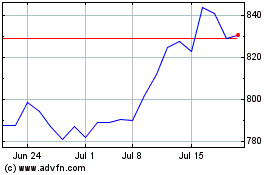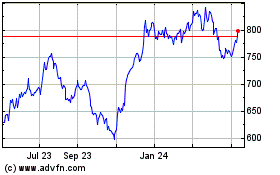By Georgi Kantchev and Sarah Kent
Abu Dhabi's $800 billion sovereign-wealth fund recently added a
new question to its investment process: How will the Earth's
changing climate affect a potential asset's price?
This addition, without fanfare or press release, was driven,
fund officials say, by a fiduciary duty to earn the highest returns
and avoid risks. It wasn't an attempt to brand the fund as more
"green."
From huge sovereign-wealth funds and hedge funds to startup
private-equity groups to mutual funds and exchange-traded funds,
asset managers and investors increasingly believe there are profits
to be made and losses to be avoided by considering how climate
change -- and government efforts to combat it -- might affect
companies and industries over the long term.
Rather than a mere window-dressing exercise conducted for the
benefit of conscientious investors, investing with the environment
in mind is now seen as a way to gain an edge. Funds are pouring
billions of dollars into technologies and industries they think
will benefit from a transition to a clean-energy world and avoiding
those that are likely to be hurt by it.
"Climate change is the growth story of our lifetime," says
Martina Turner, who four years ago launched the $36 million
Accessible Clean Energy Fund, which invests in a basket of around
30 stocks focused on energy efficiency and storage, as well as
wind, solar and geothermal energy. "We're not ideologically driven,
we're not philanthropists. We want to make money," says Ms. Turner,
whose fund is up around 20% this year through April and has
returned 22.5% since its inception.
Historic shift
The total value of funds that have integrated environmental,
social and governance (ESG) factors into their investment process
has more than quadrupled since 2014, rising to $485 billion as of
April, according to data provider EPFR Global. That figure includes
funds aimed at both individual and institutional investors, but it
represents only part of the broader climate-change investing
universe, as many funds that aren't labeled ESG also are investing
with the climate in mind, analysts say.
Climate investing is essentially a bet on a major repricing in
markets due to historic shifts in how we drive, heat our homes and
regulate our industries. Areas that stand to prosper span a broad
swath of industries from renewable energy to transport, and from
green architecture to agriculture.
Oil and coal companies, on the other hand, could lose out as
investors fear the risk of "stranded" assets if electric cars pick
up pace or governments crack down on fossil fuels. And some big
investors are looking at which industries will be most affected by
new rules and regulations, betting, among other things, against
plastic-bag makers.
Of course, climate investing isn't without risk. Investing
propositions often hinge on political will and global action, which
can be difficult to predict. After some governments started cutting
subsidies for renewable energy earlier this decade, for example,
shares of renewable-energy companies fell.
Still, funds big and small are jumping on the climate-investing
bandwagon.
BlackRock Inc., the world's largest asset manager, with more
than $6 trillion under management, has in recent years launched an
array of sustainable equity exchange-traded funds. It also is
working with clients to build a portfolio focused on companies that
are likely to be winners in a transition to a cleaner-energy
future.
WHEB Asset Management, a London-based fund manager focused on
sustainability, invests in themes such as water management,
sustainable transport and cleaner energy. An early win included an
investment in LED lighting. Now the fund is focusing on technology
that digitizes manufacturing, aiming to improve energy
efficiency.
The fund avoids sectors such as oil, gas and coal that are
likely to suffer or face severe disruption as a result of efforts
to curb climate change.
"This isn't an ethical framing," says Seb Beloe, a partner at
WHEB. "These industries are fundamentally at risk and looking at a
future with capital destruction. We want to see cash and returns,"
he says.
Climate-related investing also is getting a boost from activist
investors.
Jana Partners LLC is best-known for heckling management over
board composition and business structure. It made waves in 2017 by
helping to prompt Amazon.com Inc.'s roughly $13.4 billion
acquisition of Whole Foods Market Inc.
Now Jana is looking to set up a fund to pressure companies on
issues such as climate change, betting it can add value for
shareholders by doing so.
"The bet we're making is that we can find companies that aren't
doing everything they should be doing, buy them and get them to do
better," says Charles Penner, a Jana partner involved with the new
fund. "We think we can show you can generate outperformance by
doing that."
Who has an edge?
Reima Rytsölä, chief investment officer of Finnish pension fund
Varma, is looking for climate opportunities inside traditional
industries -- such as paint.
Varma, which manages EUR45.4 billion ($51.1 billion), has
invested in a big paint company that created a new type of coating
that makes marine vessels more energy efficient. Mr. Rytsölä bets
that as the shipping industry faces intense government pressure to
reduce its carbon footprint -- if it was a country, it would rank
as the sixth-largest greenhouse-gas emitter world-wide -- demand
for efficiency-enabling technologies will grow.
"We're trying to pick companies that have an edge inside more
traditional sectors," he says. "We might be a bit boring that
way...but climate change is affecting every industry."
Varma says it has cut the carbon footprint of its portfolio 27%
in the past two years by withdrawing from oil and coal.
"We don't consider it a trade-off with returns," Mr. Rytsölä
says, adding that while such strategies sometimes take time to come
to fruition, "in the long-run, this is the only way to generate
returns."
With climate, like any other investing opportunity, it comes
down to basics.
"You still have to be very careful about the business models,
about the fundamentals," says Lucas White, portfolio manager of the
$117 million GMO Climate Change fund. The fund, launched in 2017,
invests in companies that either help mitigate climate change --
like clean energy or smart grids -- or firms that aim to help the
world adapt. "I can't guarantee that we're going to be the ones who
get it right. But someone is gonna get it right and make a lot of
money."
--
Bradley Hope, a reporter for The Wall Street Journal in London,
contributed to this article
Mr. Kantchev is a reporter for The Wall Street Journal in
Moscow. He can be reached at georgi.Kantchev@wsj.com. Ms. Kent is a
writer in London. She can be reached at reports@wsj.com.
(END) Dow Jones Newswires
June 10, 2019 22:23 ET (02:23 GMT)
Copyright (c) 2019 Dow Jones & Company, Inc.
BlackRock (NYSE:BLK)
Historical Stock Chart
From Mar 2024 to Apr 2024

BlackRock (NYSE:BLK)
Historical Stock Chart
From Apr 2023 to Apr 2024
